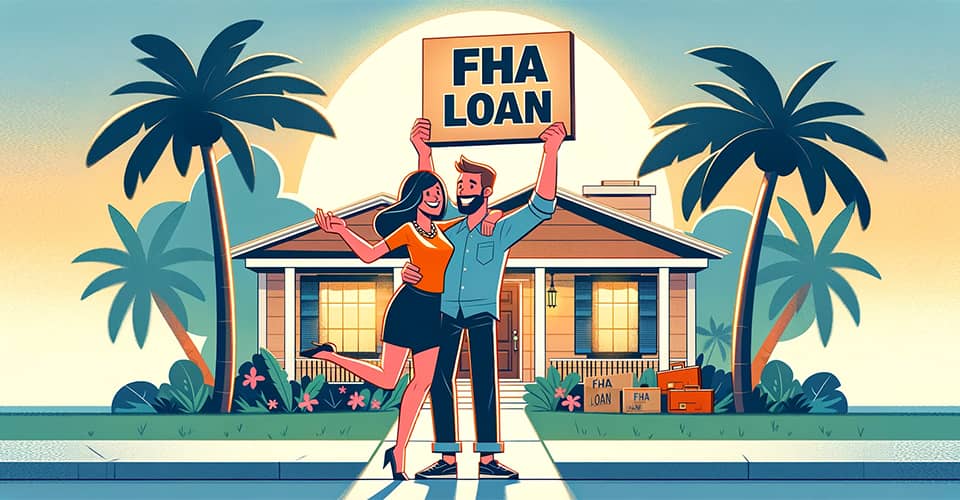What is a Florida FHA Loan and How Does it Work?
Notably, Florida FHA loans stand out for their more accessible entry requirements, such as lower minimum down payments and more lenient credit score criteria, compared to standard loans.
These loans are crafted to assist low- to moderate-income families in achieving the dream of owning a home. They appeal to first-time buyers, offering a more attainable property purchase route. Key aspects of Florida FHA loans include:
-
Targeted support for borrowers who may face challenges obtaining loans from private lenders.
-
Government insurance, which provides added security for the loans.
-
The insured nature of these loans encourages banks to offer financing to applicants with lower credit scores and minimal down payments.
- For many first-time homebuyers, an FHA loan is often the most budget-friendly and accessible mortgage option.
Understanding Florida FHA Loans
Florida FHA loans are an excellent option for individuals aspiring to become homeowners, especially those who might face challenges in qualifying for conventional loans due to their credit history.
What is an FHA Loan?
An FHA loan is a mortgage the Federal Housing Administration (FHA) guarantees. The FHA, part of the U.S. Department of Housing and Urban Development (HUD), does not lend money directly to borrowers.
Instead, it insures the loans, providing lenders with security and reducing their risk in case of borrower default. This government backing makes FHA loans less risky for lenders, enabling them to offer more favorable loan terms.
Why Choose an FHA Loan in Florida?
FHA loans in Florida present an accessible pathway to homeownership, especially for those with less-than-perfect credit or limited down payment funds.
With a low down payment requirement of just 3.5% of the purchase price, these loans are more attainable than conventional loans, which often demand a 20% down payment. Their lenient credit requirements make them ideal for buyers with lower credit scores.
Backed by the federal government, FHA loans offer a sense of security to lenders, encouraging them to cater to a diverse range of borrowers, including first-time homebuyers and individuals with less stable financial backgrounds.
Since 1934, FHA loans have helped over 40 million people achieve the dream of homeownership, specifically targeting those who may struggle to qualify for traditional mortgages.
Ideal for First-Time Homebuyers
FHA loans are often considered one of the best options for first-time homebuyers in Florida due to their lower down payment requirements and more forgiving credit criteria.
They offer a pathway to homeownership for individuals who might otherwise find their options limited, especially compared to conventional loans' stringent requirements.

What Are the Advantages of FHA Loans?
Florida FHA loans offer several benefits that make them an attractive option for homebuyers, especially those who may face challenges in qualifying for traditional loans.
One of the key advantages of an FHA loan is its flexibility regarding credit scores. Unlike conventional loans that typically require higher credit scores, an FHA loan in Florida can be obtained even with a lower credit score. This opens up the possibility of homeownership to a wider range of borrowers.
A significant benefit of FHA loans is the lower down payment requirement. You can purchase a home in Florida with an FHA loan by putting down as little as 3.5% of the purchase price. This is considerably lower than the standard 20% required by many conventional loan programs.
Moreover, the down payment for an FHA loan can be sourced from a gift or a donor, which is not always possible with conventional loans. This feature makes it much easier for borrowers with insufficient savings to cover a large down payment.
For those with credit scores on the lower end, FHA loans remain accessible. Borrowers with a credit score as low as 500 can qualify for an FHA loan, provided they can make a 10% down payment.
However, to take advantage of the maximum financing of 96.5%, a credit score of 580 or higher is required, along with a 3.5% down payment.
It is important to note that Private Mortgage Insurance (PMI) is a requirement for FHA loans. This insurance protects the lender in case the borrower defaults on the loan.
Florida FHA Loan Requirements
FHA loans are popular among homebuyers due to their more lenient lending guidelines than conventional loans. However, to be eligible for an FHA loan, borrowers must meet specific criteria set by the Federal Housing Administration.
Here are the key requirements for securing an FHA loan:
-
Primary Residence Requirement: The FHA loan must be used for purchasing your primary residence. Investment properties or second homes do not qualify.
-
Front-End Debt Ratio: Your front-end debt ratio, which includes all monthly debt payments except the mortgage, should not exceed 31% of your gross monthly income. However, some lenders may approve up to 40% ratio under certain circumstances.
-
Back-End Debt Ratio: This ratio encompasses the mortgage and all other monthly debts and cannot exceed 43% of your gross monthly income. Again, in some cases, lenders may allow a ratio as high as 50%.
-
Down Payment: A minimum down payment of 3.5% of the home’s purchase price is required. This down payment can be funded through personal savings, relatives' gifts, or government assistance.
-
Credit Score Requirements: A minimum FICO score of 500 is necessary to qualify. With a score between 500 and 579, you'll need a 10% down payment. A score of 580 or higher allows for a minimum 3.5% down payment.
-
Employment History: Applicants should have a steady employment history, preferably working with the same employer for at least two years.
-
Income Verification: Your income must be verified through pay stubs, bank statements, and federal tax returns.
-
Property Appraisal: The property you wish to purchase must be appraised by an FHA-approved appraiser and meet HUD’s property guidelines.
- Post-Bankruptcy Waiting Period: If you have a Chapter 7 Bankruptcy in your history, you must wait at least two years after the discharge date before applying. The discharge date is different from the date the bankruptcy was filed.
Every FHA Government Program Available for Florida Homebuyers
FHA programs are known for their flexible credit requirements and lower down payments, making them accessible to many buyers.
Here, we'll explore each program's unique benefits, ideal candidates, and qualification criteria to help you find the best option for your needs.
FHA Basic Home Mortgage Loan 203(b)
- Benefits: Low down payment (as low as 3.5%), easier credit requirements.
- Ideal For: First-time homebuyers, those with lower credit scores.
- Eligibility: Credit score minimums, property limitations.
FHA Home Mortgage Rehab Loan 203(k)
- Benefits: Finance home purchase and repairs, fixed or adjustable-rate.
- Ideal For: Buyers of fixer-uppers, real estate investors.
- Eligibility: Credit score requirements, DTI limits.
HUD Good Neighbor Next Door Program
- Benefits: 50% discount on home price, no down payment.
- Ideal For: Teachers, first responders.
- Occupational Requirements: Employment in specific sectors.
FHA Energy Efficient Mortgage
- Benefits: Finance energy improvements, no additional qualifications.
- Ideal For: Eco-conscious buyers, those seeking utility savings.
- How to Apply: Energy audit, eligibility check.
FHA Condo Loan Program
- Benefits: Easier condo financing, lower rates.
- Ideal For: Condominium buyers, urban dwellers.
- Eligibility: Condo association approval, occupancy rules.
FHA Cash Out Refinance Program
- Benefits: High LTV ratios, fixed interest rates.
- Ideal For: Homeowners needing cash, debt consolidation.
- Eligibility: Existing loan types, credit score minimums.
FHA Adjustable Rate Mortgage Program
- Benefits: Lower initial rates, rate increase cap.
- Ideal For: Short-term homeowners, income growth expectants.
- Eligibility: Credit score requirements, adjustable-rate terms.
FHA Manufactured Home Loan & Lot Program
- Benefits: Financing for manufactured homes and lots.
- Ideal For: Manufactured home buyers, rural residents.
- Eligibility: Home and land specifications, consumer protection.
FHA Reverse Mortgage Program
- Benefits: Convert equity to cash, no monthly payments.
- Ideal For: Seniors, retirees.
- Qualification: Age requirements, home equity.
FHA Section 248 Indian Reservation Program
- Benefits: Low down payment, flexible qualifications.
- Ideal For: Low-income families, buyers with limited credit.
- Eligibility: Income and credit standards, property requirements.
FHA Streamline Refinance
- Benefits: Simplified process, no appraisal needed.
- Ideal For: Current FHA loan holders, quick refinancing seekers.
- Eligibility: Existing FHA loan, on-time payment history.
FHA Limited Refinance Program
- Benefits: No appraisal, minimal paperwork.
- Ideal For: Current FHA loan holders, those seeking lower payments.
- Eligibility: No delinquencies, credit score criteria.
FHA Disaster Victims Mortgages 203(h) Program
- Benefits: Fast approval, no down payment.
- Ideal For: Disaster victims, rebuilding efforts.
- Eligibility: Location in the disaster area, proof of loss.
FHA Hawaiian Homelands Program
- Benefits: Low rates, leasehold financing.
- Ideal For: Native Hawaiians, eligible for leased land properties.
- Eligibility: Native Hawaiian descent, land lease agreement.
Each FHA program offers unique benefits tailored to different homebuyers' needs. Whether you're a first-time buyer, looking for a fixer-upper, or seeking efficient refinancing options, an FHA program can help you achieve your homeownership goals in Florida.
2024 FHA Loan Limits in Florida
In 2024, the upper threshold for FHA loans in regions with high living costs is $929,200, while the lower boundary in areas with lower living costs is $498,257. Annually, FHA adjusts these limits to reflect fluctuations in housing market prices.
FHA loan limits in Florida vary significantly across counties, reflecting the diverse real estate market conditions. These limits are adjusted for different property sizes, from single-family homes to four-family units, catering to a wide range of housing needs.
The updated limits are especially relevant for first-time homebuyers and those seeking larger family homes, as they directly influence the borrowing capacity under FHA loans.
The maximum loan amounts under the FHA program in Florida differ by property type, with the highest limits allocated for larger or multi-family properties.
FHA loan limits are typically revised annually to accommodate the changing real estate market, ensuring loan amounts align with current housing prices and market conditions.
The limits are primarily based on the median home prices in each county and are also influenced by national statutory limits. Economic indicators and specific housing market trends within Florida further shape these limits.
The FHA loan limits dictate the maximum loan amount available for those considering refinancing, making it a critical factor in the refinancing decision-making process.
Debt-to-Income Ratios for FHA Loans in Florida
Florida's FHA loans are accessible to various income levels, with no strict income limits set. This flexibility allows individuals from various financial backgrounds to consider an FHA loan for their home purchase.
However, an important aspect that lenders focus on is the borrower's debt-to-income ratio (DTI).
How DTI Affects Your FHA Loan Eligibility
The debt-to-income ratio is a crucial factor in the FHA loan approval process. It is determined by dividing your monthly debt payments by your gross (pre-tax) income. This ratio helps lenders effectively assess your ability to manage monthly payments and debts.
Generally, lenders prefer a DTI ratio of less than 57 percent. This threshold indicates that you are not overly burdened by debt and are more likely to manage additional loan payments successfully.
The Role of Housing Ratio in FHA Loans
Another key metric is the housing ratio, which considers the portion of your gross income allocated to housing expenses, including principal, interest, taxes, and insurance.
A lower housing ratio is favorable as it suggests that a significant portion of your income is not tied up in housing costs, thereby reducing the risk of financial strain.
Salary and FHA Loan Qualification
While FHA loans do not have specific income requirements, your salary is critical in determining your DTI and housing ratios.
A higher income can offset existing debts, leading to a lower DTI ratio. This makes you a more attractive candidate to lenders, indicating a stronger capacity to handle additional loan payments without financial hardship.
Key Takeaways for Prospective Borrowers
-
No Income Limits: FHA loans in Florida are not restricted by borrower income levels.
-
DTI Importance: A lower debt-to-income ratio is crucial for loan approval, with a preference for a DTI under 57 percent.
-
Housing Ratio Consideration: Lenders assess the proportion of income dedicated to housing costs.
- Income's Role: Higher salaries can improve your DTI and housing ratios, enhancing your loan eligibility.
With over 50 years of mortgage industry experience, we are here to help you achieve the American dream of owning a home. We strive to provide the best education before, during, and after you buy a home. Our advice is based on experience with Phil Ganz and Team closing over One billion dollars and helping countless families.

About Author - Phil Ganz
Phil Ganz has over 20+ years of experience in the residential financing space. With over a billion dollars of funded loans, Phil helps homebuyers configure the perfect mortgage plan. Whether it's your first home, a complex multiple-property purchase, or anything in between, Phil has the experience to help you achieve your goals.


 By
By  Edited by
Edited by 





